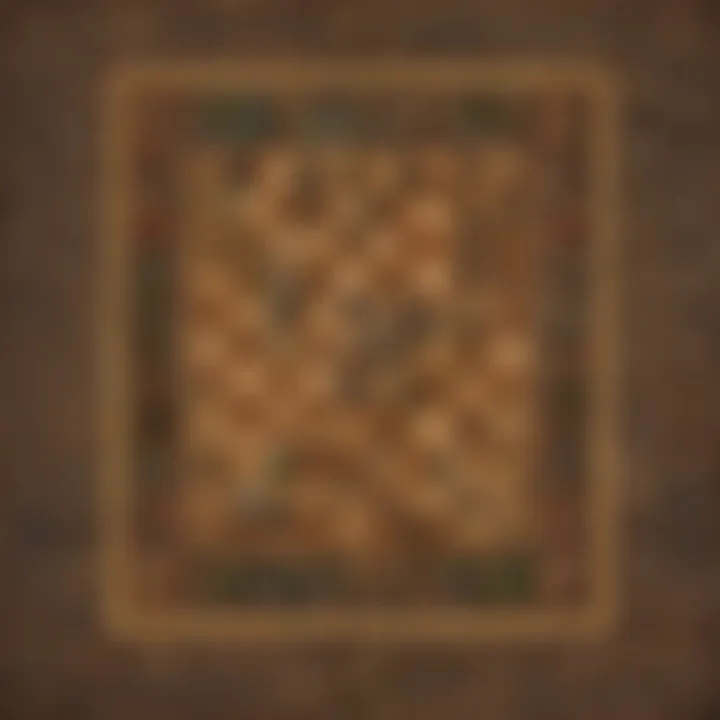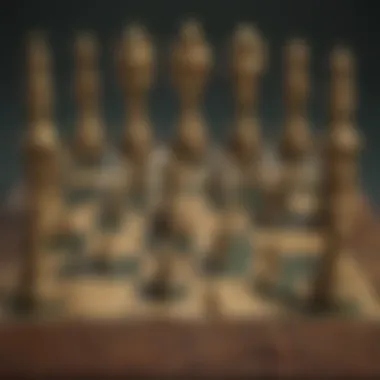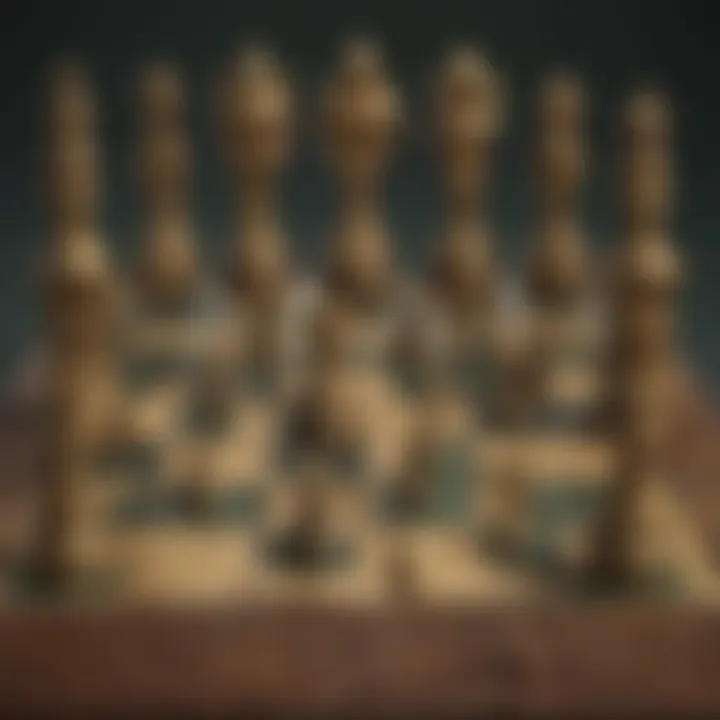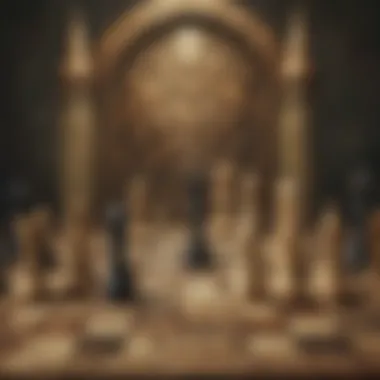Chess Strategies and Zelda's Narrative Complexity


Intro
The relationship between chess and the Legend of Zelda series is not immediately apparent. However, a closer examination reveals a rich tapestry woven with shared themes of strategy and complexity. Both domains challenge the mind. Chess, a centuries-old game, emphasizes tactical thinking and foresight. Meanwhile, the Legend of Zelda franchise is renowned for its intricate narratives and character interactions. This article will explore how chess principles enhance the understanding of gameplay in the Zelda universe.
This exploration will delve into gameplay features, character analyses, lore discussions, and strategies drawn from chess mechanics. By aligning the strategic depths of these two realms, the aim is to provide insights that resonate with both gaming enthusiasts and analysts. Throughout this journey, we will uncover parallels that not only enrich gameplay experience but also illuminate the storytelling aspects that make the Zelda series captivating.
Game Reviews
Gameplay Features and Mechanics
In both chess and Zelda, gameplay revolves around critical decision-making. Chess players anticipate their opponent's moves while strategizing their own. Similarly, players navigate through Hyrule, where each action bears weight. The mechanics of Zelda games are diverse, encompassing combat, puzzle solving, and exploration.
Elements of Strategy
- Positioning: The positioning of pieces in chess mirrors character positioning in Zelda, where players must consider the placement of Link and enemies on the battlefield.
- Resource Management: Just as chess players manage their pieces, Zelda players gather items and power-ups, optimizing their approach to each challenge.
- Turn-Based Thinking: In chess, foresight is essential for success. This concept transfers to puzzle-solving mechanics in Zelda, where players often need to solve challenges by predicting outcomes.
Storyline and Quests
The narrative depth of Zelda is a cornerstone of its charm. Each title presents a unique storyline, complemented by rich lore and character interactions. Quests often present moral dilemmas, drawing parallels to chess, where each move can alter the game's overall outcome.
Visuals and Sound Design
Visual aesthetics in Zelda games are intricate and deliberate, much like the design of chess pieces. The geometric simplicity of boards and pieces in chess finds a counterpart in the vibrant landscapes of Hyrule. Sound design also plays a pivotal role, with music enhancing the immersive experience, similar to the strategic atmosphere of a chess match.
Comparison with Previous Titles
Throughout its history, the Legend of Zelda series has evolved, with each installment deepening its connection to strategic play. Comparing The Legend of Zelda: Ocarina of Time to Breath of the Wild, it is clear that while gameplay mechanics have diversified, the essence of thoughtful strategy remains central.
Character Analyses
Popular Characters Overview
The characters in Zelda embody diverse traits that can be likened to chess pieces, each with their unique strengths and weaknesses. Link, the protagonist, stands as the knight, while Princess Zelda often symbolizes the queen.
Character Development and Backstories
Character arcs in Zelda echo the complexity of chess strategies. Each character grows through their challenges, reflecting shifts in the gameplay dynamics seen on a chessboard.
Role in the Zelda Universe
Understanding the role of each character can yield insights into gameplay strategies. Players must consider not only their character's abilities but also the dynamics of their relationships with others in the game, paralleling chess piece interactions.
Fan Theories and Speculations
The rich lore has inspired numerous fan theories. Much like analyzing a chess match, fans debate strategies employed by characters, seeking to uncover hidden meanings and connections within the narrative.
Lore Discussions
Mythology and Worldbuilding
Zelda's intricate mythology often reflects broader themes found in history and philosophy, similar to the strategic nature of chess that has values rooted in human thought.
Legendary Items and Artifacts
Items like the Master Sword and the Triforce are central to the games’ mythology. Collectively, these artifacts can be examined as valuable pieces in a chess match, each affecting the overall outcome.
Link to Real-world Mythologies
The connection to various mythologies offers depth that resonates throughout gameplay. Players find familiarity in themes, whether they are in a chess match or traversing through Hyrule.


Timeline Placement and Theories
Fans have attempted to categorize Zelda's timeline with varying theories, similar to analysis in chess where positions reflect historical plays. Understanding these timelines can further enrich the player’s strategy.
Gameplay Strategies
Combat Techniques and Tips
Players can benefit significantly from chess-like strategies in combat. Positioning and foresight are vital. Employing techniques akin to chess maneuvers can enhance effectiveness in encounters.
Puzzle Solutions and Walkthroughs
Utilizing strategic thinking is necessary for solving puzzles. By approaching puzzles like a chessboard, players can methodically break down challenges.
Collectibles and Side Quest Guides
Exploring Hyrule is akin to expanding one's chess repertoire. Players must seek out collectibles, paralleling the tactical gathering of chess pieces to gain a strategic advantage.
Boss Battles Tactics and Strategies
Adapting chess strategies to boss battles can vastly improve outcomes. Understanding the boss's movements and planning actions in advance can lead to success.
Ending
Preface to the Legend of Zelda and Chess
The realms of chess and the Legend of Zelda series may seem distant at first glance, but they converge in fascinating ways. The intricate strategies of chess parallel the complexities of gameplay found in the Zelda universe. Understanding this connection enhances our appreciation of both. This interplay offers valuable insights into dynamic storytelling and strategic gameplay. Exploring this intersection reveals deeper themes within the narrative and gameplay mechanics.
Overview of the Legend of Zelda Series
The Legend of Zelda series, created by Nintendo, is a cornerstone of the action-adventure genre. First released in 1986, it introduced players to a vast world filled with exploration, puzzles, and combat. The main protagonist, Link, embarks on quests that often revolve around saving Zelda and defeating the antagonist, Ganon. Each installment expands its lore. The game particularly focuses on themes of courage, wisdom, and power, often symbolized through unique artifacts and character motivations.
Moreover, the Zelda series is celebrated not just for its gameplay, but for its narrative depth. Players connect various elements such as quests, items, and even the geography of Hyrule. This interconnectedness can be likened to a chessboard, where every piece has a specific role, and every move has consequences.
The Game of Chess: A Brief History
Chess has a rich history that dates back over a thousand years. Originating from ancient India, it traveled through Persia and into Europe, evolving into the game we recognize today. The objective is simple: checkmate the opponent's king. However, the strategic depth is profound. Each piece, from the pawn to the queen, has distinct movements and importance.
Chess has been used as a metaphor for conflict and strategy in various cultures. Players learn to foresee the opponent's actions and plan their moves accordingly. This ability to anticipate and counteract is a skill that resonates within the gameplay tactics of the Zelda series.
"The game of chess is not just an exercise in tactics; it is a study of patience and foresight, echoing the trials faced by Link in his adventures."
Understanding Chess Mechanics
Understanding chess mechanics is essential to appreciating the strategic complexities within the Legend of Zelda series. Chess is more than just a game; it is a systematic approach to conflict and problem-solving. Through the lens of chess, we grasp how every move matters. This understanding can translate into how players approach challenges in the Zelda universe. By examining the underlying mechanics of chess, we can uncover how these principles manifest in character dynamics, strategic planning, and game design.
Basic Rules and Objectives
At its core, chess is about defeating your opponent by checkmating their king. Each player begins with 16 pieces, including a king, queen, bishops, knights, rooks, and pawns. Every piece has unique movement abilities. The standard setup places pieces on an 8x8 board, and players alternate turns. The objective is to strategize your moves to control the board while protecting your pieces and ultimately delivering a checkmate.
In comparison, the Legend of Zelda series emphasizes adventure and quest completion, yet it draws on similar principles of strategy. Players navigate vast worlds, make tactical decisions, and solve puzzles, mirroring how chess players must think ahead and anticipate their opponent’s responses.
Common Strategies and Tactics
Chess players often employ various strategies to outmaneuver their opponent. These include:
- Controlling the center: Dominating the central squares can provide greater mobility for your pieces.
- Developing your pieces: Getting rooks and knights into play early is essential for controlling the board.
- King safety: Ensuring the king is shielded, often by castling, is crucial for defense.
In Zelda, these tactics can be seen as players seek to control their environment, whether solving a puzzle, defeating a boss, or navigating complex dungeons. The need for forethought, calculated risks, and adaptability echoes chess strategies.
The Role of Pieces and Their Movement


In chess, each piece has specific roles and movement capabilities. Understanding these is vital:
- Pawn: Moves forward but captures diagonally. Represents potential and advancement.
- Rook: Moves in straight lines, offering control over rows and columns.
- Bishop: Moves diagonally, emphasizing the importance of positioning.
- Knight: Unique for its L-shaped movement, introducing unpredictable tactics.
- Queen: Combines the power of rooks and bishops, acting as a versatile major piece.
- King: The most important piece—losing it results in defeat.
In the Legend of Zelda, characters also assume roles. Link functions like a knight, utilizing agility and strategic positioning. Zelda often embodies the queen, exerting influence across the game’s narrative and mechanics. Each character's movement and abilities reflect the roles seen in chess, deepening the thematic connections between the two realms.
By understanding character roles as chess pieces, players can appreciate the depth of strategy both in chess and the Zelda series.
Thematic Parallels Between Zelda and Chess
The thematic parallels between The Legend of Zelda series and chess offer a rich understanding of both gameplay mechanics and narrative depth. This connection reveals how strategic thinking and character dynamics align in two seemingly different worlds. Analyzing these themes enriches the exploration of decision-making processes faced by players in both chess and the Zelda universe. Notably, it emphasizes the intricate designs that resonate profoundly with enthusiasts of both formats.
Heroism and Strategy in Gameplay
In both chess and The Legend of Zelda, heroism often manifests through strategic maneuvers rather than sheer might. Link, the protagonist, embodies the idea of a knight—not just in movement but in behavior. His adventures are not merely about battling foes but also about devising strategies to overcome obstacles. Just like in chess, where every piece serves a purpose, Link relies on the unique abilities granted by his items and allies.
Consider the item mechanics in Ocarina of Time, where players must use boomerangs, bombs, and arrows strategically. Each item parallels a chess piece's role, contributing to the overarching objective of fulfilling quests. Players must think multiple moves ahead, thereby engaging in a form of tactical foresight akin to how one approaches a chessboard.
Conflict as a Central Mechanism
Conflict is a shared element in both chess and the narrative arcs of The Legend of Zelda. In chess, the conflict is structural; it is a battle of intellect and foresight rather than physical confrontation. Similarly, in Zelda, conflict arises through the interactions between Link, Zelda, and Ganon. The nature of these confrontations speaks to a broader human experience ingrained in storytelling.
Players engage in strategic planning, considering not only direct attacks but the implications of each move. The battles against Ganon can be seen as strategically navigating a chessboard, where each interaction impacts overall gameplay and narrative outcomes. Thus, both chess and the Zelda series elevate conflict into an art of strategy and anticipation.
Exploring Loyalty and Betrayal
Loyalty and betrayal weave complex narratives within chess and the Zelda franchise. In chess, each player's allegiance to their pieces relies on maintaining control over the board. A poorly timed sacrifice can lead to betrayal of trust in the player's own strategy. In Zelda, this theme is portrayed through character relationships that can shift rapidly.
Take the relationship between Link and other characters. They often offer aid, yet motivations can shift, reflecting the unpredictability of chess. The duality of trust and strategy in both domains underscores pivotal moments. For instance, in Zelda: Breath of the Wild, characters may initially seem loyal but later reveal hidden alliances or ambitions, paralleling the calculated risks in chess where a move can turn the tide unexpectedly.
These interwoven themes of heroism, conflict, loyalty, and betrayal demonstrate how chess strategies enhance our understanding of the Zelda narratives. They illuminate the cerebral nature of both games, encouraging players to reflect on not just their moves but also the broader implications of their choices.
Character Analysis Through the Lens of Chess
Analyzing characters in terms of chess provides a unique perspective on their roles and functions within the narrative of the Legend of Zelda. This approach not only enhances our understanding of character dynamics but also illustrates how strategic thinking influences their interactions and decisions. By juxtaposing key figures from Zelda with chess pieces, we can better appreciate the layers of depth in their actions and the overarching themes of strategy and betrayal that permeate the series. This analysis is significant in understanding how characters embody various chess strategies, reflecting their strengths and weaknesses in both gameplay and storyline.
Link: The Knight Tactician
Link, the iconic hero of the series, resonates with the characteristics of a knight in chess. The knight's ability to make unique and complex moves reflects Link's adaptability in various challenges. Unlike more predictable pieces, the knight can leap over others, embodying Link's ability to navigate through obstacles and engage with the world in innovative ways. This quality is evident in Link's quests, where his keen tactical thinking often leads to unforeseen solutions to puzzles and conflicts. Furthermore, the knight is often seen as an attacker or support piece, aligning with Link's role as both a warrior and a helper to his allies, showcasing a balance of offensive and defensive strategies.
Zelda: The Queen's Influence
Zelda occupies the role of the queen, a powerful piece on the chessboard known for its versatility and significance. She is not only a pivotal character in the narrative but also influences the world around her through her wisdom and strength. Just as the queen can move in any direction and control vast spaces on the board, Zelda's presence often drives the plot forward and impacts the hero's journey. Her ability to strategize and manipulate situations demonstrates the profound influence she has over the fate of Hyrule. In the timeline of the games, Zelda frequently acts as a guiding force, reflecting the queen's role as both a protector and an aggressor when the need arises.
Ganon: The King of Chaos
Ganon, as the primary antagonist, embodies the role of the king, a piece that, while powerful, is ultimately vulnerable. In chess, the king moves only one square at a time, but its capture signifies the end of the game. This tension mirrors Ganon's constant quest for power while also facing limitations that come with immense ambition. He operates as the chaotic force within Hyrule, manipulating various events in an attempt to dominate. His strategic games often mirror those played on a chessboard, where positioning and calculated aggression can determine the outcome. Understanding Ganon through this lens reveals how personal ambition can disrupt balance and lead to downfall.
Supporting Characters as Chess Pieces
The Zelda series features numerous supporting characters that can be likened to various chess pieces, each serving a unique purpose within the broader narrative framework. For instance:
- Navi: Evolving from the pawn, she offers guidance but requires Link to utilize her effectively.
- Impa: As a rook, she provides stability and defense, representing the protector role in Link's quests.
- The Great Fairies: Functioning similarly to bishops, they grant aid and power, enhancing Link's abilities.
Each supporting character contributes to the strategic gameplay, enriching player experience and narrative depth. By analyzing how these characters function in relation to Link and Zelda, players can glean insights into the intricate relationships that foster the lore of Hyrule.
"Chess is a game of strategy, revealing the ambitions and motivations of each character on the board of life as they engage in their respective battles."
Through this lens, we obtain a multifaceted understanding of character significance, emphasizing that each piece—be it hero or villain—has a strategic role to play in the grand narrative of the Legend of Zelda.


Game Design and Chess Principles
Game design continually evolves to incorporate various elements that enhance player engagement. When looking at the interaction of chess and the Legend of Zelda, one can see profound influences rooted in chess principles. Recognizing this connection helps provide insight into why these elements resonate so deeply with players. Understanding how strategic thinking, character utility, and gameplay mechanics converge offers a richer appreciation of both realms.
Incorporating Chess Mechanics in Gameplay
The infusion of chess mechanics into gameplay can be seen in many facets of the Zelda series. Chess requires players to think multiple moves ahead and anticipate the opponent's strategy. Similarly, Zelda games often demand that players strategize their actions, choose correct items for various encounters, and plan their routes through complex dungeons. For example, the weapon variety in games like Breath of the Wild mimics the diverse piece types in chess: each weapon has unique strengths and weaknesses. This necessitates players to adopt a tactical mindset while navigating the game world.
Moreover, encounters with enemies can reflect chess-like scenarios where players must evaluate positional advantages and make calculated decisions. This strategic layer enriches the overall experience, inviting players not just to react but to think critically about their movements and decisions.
Strategic Decision-Making in Game Scenarios
Strategic decision-making plays a pivotal role in both chess and Zelda. Each game scenario can be seen as a unique board where players must evaluate potential risks and rewards. The choices made during gameplay often reflect chess principles, where every move can either build an advantage or lead to failure. Players must consider several factors:
- The positioning of characters and items
- Potential threats from enemies
- Available resources and abilities
For instance, when players face formidable bosses, they must analyze the patterns of the boss's attacks. This mirrors the chess scenario of predicting an opponent's next move. Anticipating strategies and understanding the environment contribute to better decision-making, ensuring each player's success varies based on their tactical execution.
Puzzle Elements Reflecting Chess Challenges
Puzzles in Zelda often hinge on logic and foresight, much like solving a chess problem. Players navigate intricate designs where they must employ both lateral and vertical thinking. Chess puzzles challenge players to find the best series of moves that lead to victory. In a similar way, Zelda puzzles engage players in discovering mechanisms that interlink gameplay elements.
For example, using the time-manipulation mechanic in Ocarina of Time necessitates players to plan their actions carefully, akin to setting up a checkmate in chess. Tasks such as moving blocks, activating levers, and defeating enemies systematically can reflect chess strategies, where positioning and timing are critical to success.
The challenge of these puzzles not only keeps players engaged but also promotes skills like problem-solving, creativity, and strategic thought, which are also central to chess.
"Incorporation of chess principles enriches gameplay, ensuring that players remain intellectually challenged throughout their journey."
Cultural Impact of Chess in Gaming
The intersection of chess and gaming is a captivating area to explore. Chess has a long-standing history, not just as a board game but also as a cultural reference that appears across various media. This section addresses the importance of chess in video games and how its principles shape narratives and gameplay. The nuances of chess strategy can often provide a richer experience in video game storytelling and character development.
Chess in Video Game Narratives
Chess often serves as a metaphorical and literal element in video game narratives. In many games, including those in the Legend of Zelda series, strategic thinking and planning mirror the musty practices found in a game of chess. For instance, a player must think several steps ahead, similar to anticipating the moves of an opponent in chess. This element of strategy enhances the depth of this narrative, as players engage with plotlines that require foresight and tactical decision-making.
Furthermore, chess can manifest in character relationships where loyalty and betrayal are themes. In Zelda, characters often embody roles similar to chess pieces. For example, Link's role is akin to that of a knight—dynamic and versatile—while Zelda's character represents the powerful queen, whose influence is pivotal. These narrative parallels may deepen the audience's understanding of character motives and the implications of strategic decisions.
Influence of Chess on Player Mindsets
The presence of chess within video games influences how players approach challenges. It cultivates a mindset centered on planning, patience, and foresight. Players learn to assess risks and evaluate outcomes, enhancing their problem-solving skills. This effect is observable in titles where strategy defines not only gameplay but also how players interact with the game world.
One could argue that mastering chess strategies enhances one’s ability to navigate complex game mechanics and narratives. Players who engage with chess concepts become skillful in resource management and developing adaptive strategies against varying obstacles. A profound understanding of chess can lead them to apply similar analytical frameworks in the Zelda universe, allowing for richer game experiences.
"Chess in video games is not just an element of gameplay; it's also a lens through which stories are told and strategy is executed."
Closure: Reflecting on Strategy and Lore
The connection between chess and the Legend of Zelda is profound. Both settings involve strategic thinking and decision-making, requiring players to engage with the narrative and game mechanics critically. This conclusion chapter summarizes key insights drawn from character analyses and design principles showcasing how these two worlds interact. The relationship encourages a deeper understanding of gameplay and story.
Final Thoughts on Zelda and Chess
In the realm of video games, The Legend of Zelda and chess represent two distinct yet overlapping domains. While chess is defined by its structured rules and strategic possibilities, Zelda thrives on dynamic storytelling and exploration. The synergy between the two lies in their ability to challenge players not only to think critically but also to immerse themselves in lore. Every move in chess is akin to a choice made by Link or Zelda; it requires foresight and an understanding of opponents' strategies. This parallel elevates gameplay and makes every decision meaningful.
- Narrative Depth: The intricate plots in Zelda add layers to character motivations seen in chess. For instance, Link's quests often reflect the strategic repositioning seen on a chessboard.
- Character Dynamics: Each character in Zelda can be seen as a chess piece, with their unique roles enhancing both the strategy and lore of their worlds.
In essence, players of both chess and Zelda are immersed in a dance of wits, where every encounter inches them closer to victory or defeat, echoing the timeless nature of both games.
Future Implications for Game Design
The interdisciplinary nature of chess and video games invites innovative design philosophies for future projects. Developers can enhance user experience by integrating elements from both realms. Ideas to consider include:
- Enhanced AI Behavior: Drawing from chess strategies, game AI could become smarter. It would adapt and respond like seasoned chess players.
- Complex Decision Trees: In future Zelda entries, the branching paths of decision-making can be expanded. This mirrors the multi-layered strategies of a chess game.
- Strategic Gameplay Elements: Incorporating chess-like mechanisms in puzzles could deepen engagement and challenge players for critical thinking.
Furthermore, the influence of chess on gaming narratives can foster stories rich with strategy and philosophical depth. Developers should consider how characters' motivations can reflect chess strategies, enhancing the overall experience.
"By examining the intersection of chess and the Legend of Zelda, we unveil the intertwined destiny of strategy and lore. This opens a path to potential growth in narrative-driven games."





